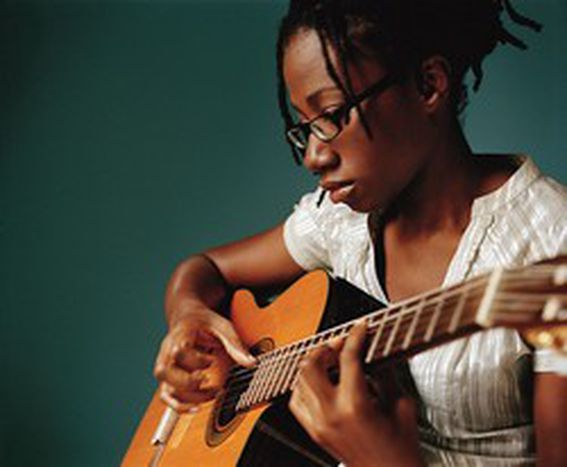
Asa: Africa has everything that rich countries don’t
Published on
Translation by:
Nabeelah ShabbirThe Nigerian singer, 25, lives between Paris and Lagos, incarnates Afro-folk music and is the latest MTV favourite
I meet Asa (pronounced ‘Asha’) in the building of her record company Naïve, in the heart of the hubbub of the Parisian neighbourhood of Pigalle, near the Moulin Rouge. It’s the final and busiest day promoting the latest soul revelation's eponymous album. She has just finished a live session, and is putting away her guitar in a case almost bigger than her, and I notice there’s nothing fragile about her with her stock glasses, rasta hair and huge smile which stretches from ear to ear.
Asa: 'Fire on the Mountain'
Asa was born in Paris in 1982, where she spent her first years before her parents decided to return to Africa, on the way to Nigeria. She would liked it if they hadn’t left so early on in her life to experience growing up in Paris, although later on she stopped seeing this as a a bad choice. She learned to love Africa, and didn’t want to leave her native Nigeria.
Since then, she feels it’s her duty to pass on this feeling to other young Africans. ‘Why would I live in a country where they would treat me badly?’ she asks. When I ask her what she’d say to those young people who dream of going to the west, she replies that she understands them. ‘When you’re young, it’s normal to want other things.’
Far from home
In fact, Asa discovered the ‘other’ quite early on. When she was twenty, she participated in a young artists programme organised by the Ministry of Foreign Affairs and landed a scholarship to spend three months in France, where she discovered France and Europe synonymised ‘an opening, opportunities where the culture was more accessible.’ Above all she feels ‘grateful’ to the people who knew how to be ‘hospitable and encouraging’ with her.
Nevertheless, Lagos was her home. At least, compared to New York, this city embodied a continuous mixed race, a place where various religions co-existed peacefully and in which cultures mix and interact. She has no qualms when she speaks about her childhood in Festac Town, a neighbourhood which could be described as a ghetto. ‘I prefer to call it the projects, because that’s what it was. A beautiful project which didn’t end up carrying out everything. It’s true that it was a popular neighbourhood and really poor at that, but many artists lived there. There was a lot of friendships and we laughed a lot together.’ Sometimes Asa asks herself if she had a ‘really happy childhood.’ When she’s back in France, she always feels like she is ‘just visiting.’
Musical exploration
A regular explorer who never forgets her roots, Asa contributes a critical vision of our society. She likes criticism in France, and moved from improvisation, her preferred form of expression, to writing. The period of radio competitions was far. She remembers well the satisfaction she had 'of not having won' in the two competitions she took part in. ‘When I listen to the first song I recorded, I realise there’s still a long way to go.’
Asa, who goes against classic values. Asa, rejected by choirs for having a voice that was too deep. Raised by a father who loved black-American music, with a soul-reggae tendency, fascinated by Nina Simone, Marvin Gaye, Aretha Franklin, afro-folk, between the tracks of Tracy Chapman, Erykah Badu and Ayo. She remembers that for a long time her public included 'an imaginary multitude who came to listen to me play the piece of wood which I used as a guitar.’
Sorceress
She knew she had ‘something to say’ since she was little, a message whose melodic rhythms never changed. Asa talks and smiles, resigned to what she designates a ‘duty,’ immersed in what was going on inside her. When a PR guy interrupts to tell Asa she is needed to attend a dinner, I ask for a few minutes with her, to understand more about what she means, so that she can tell me where she usually travels and if she likes novelties. About her ‘special link’ with France, a country where she doesn’t feel at home but where she comes above all to find ‘ideas, talents,’ which she will use at the appropriate moment when she returns home. Does she think Europe respects immigrants of African origin? In her response, she mentions her disgust at president Sarkozy’s latest project to impose DNA tests on immigrants.
’All the immigrants need to go back, complete with fresh wisdom,’ she says. ‘All they need is to go back to their homes, the only place where they can be themselves. Why accept oppression when our native countries need us?’ She shrugs her shoulders, ‘They call Africa is a developing territory, but we have everything that rich countries don’t: friendship, solidarity and laughter.’
Translated from Asa : « L’Afrique a tout ce qui manque aux pays riches »



